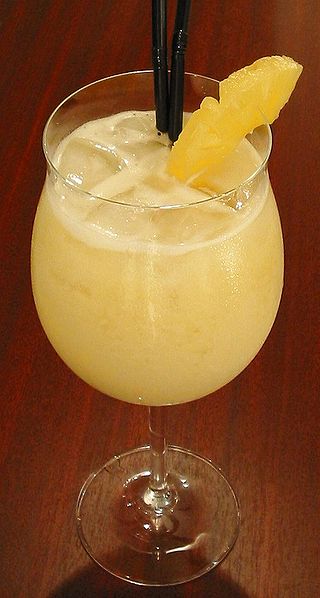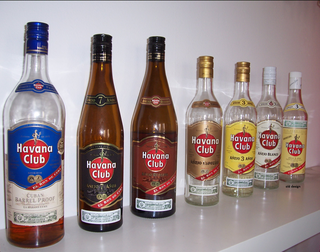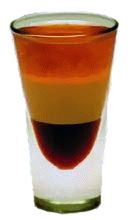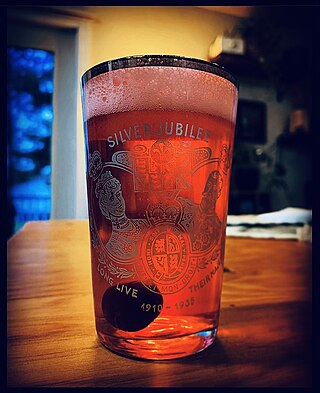
Bacardi Limited is the largest privately held, family-owned spirits company in the world. Originally known for its Bacardí brand of white rum, it now has a portfolio of more than 200 brands and labels. Founded in Cuba in 1862 by the Spanish businessmen Facundo Bacardí Massó, Bacardi Limited has been family-owned for seven generations, and employs more than 8,000 people with sales in approximately 170 countries. Bacardi Limited is the group of companies as a whole and includes Bacardi International Limited.

Rum and Coke, or the Cuba libre, is a highball cocktail consisting of cola, rum, and in many recipes lime juice, on ice. Traditionally, the cola ingredient is Coca-Cola ("Coke") and the alcohol is a light rum such as Bacardi; however, the drink may be made with various types of rums and cola brands, and lime juice may or may not be included.

Mojito is a traditional Cuban punch. The cocktail often consists of five ingredients: white rum, sugar, lime juice, soda water, and mint. Its combination of sweetness, citrus, and herbaceous mint flavors is intended to complement the rum, and has made the mojito a popular summer drink.

The Piña Colada is a cocktail made with rum, cream of coconut, and pineapple juice, usually served either blended or shaken with ice. It may be garnished with either a pineapple wedge, maraschino cherry, or both. The drink originated in Puerto Rico.

The Zombie is a Tiki cocktail made of fruit juices, liqueurs, and various rums. It first appeared in late 1934, invented by Donn Beach at his Hollywood Don the Beachcomber restaurant. It was popularized on the East coast soon afterwards at the 1939 New York World's Fair.

Caipirinha is a Brazilian cocktail, of São Paulo origin, with cachaça, sugar, lime, and ice. The drink is prepared by mixing the fruit and the sugar together, then adding the liquor.

The daiquiri is a cocktail whose main ingredients are rum, citrus juice, and sugar or other sweetener.

Bacardi 151 is a discontinued brand of highly alcoholic rum made by Bacardi Limited of Hamilton, Bermuda. It is named for its alcohol concentration level of 151 U.S. proof, that is, 75.5% alcohol by volume. This is much higher than typical rum, which averages around 35%–40% alcohol by volume. Bacardi 151 was sold in the United States and Canada from at least 1963 until 2016, when its production was discontinued.

Havana Club is a brand of rum created in Cuba in 1934. Originally produced in Cárdenas, Cuba, by family-owned José Arechabala S.A., the brand was nationalized after the Cuban Revolution of 1959. In 1993, French-owned Pernod Ricard and the government of Cuba created a state-run 50:50 joint venture called Corporación Cuba Ron. They began exporting this version of Havana Club globally, except for the United States due to the embargo put in place by the U.S. government.
Bacardi Superior is a white rum made by the Bacardi Company. In the US it is bottled at 80 proof and at 75 proof in the UK and Continental Europe. This rum is mostly used to make cocktails calling for a white rum such as Cuba Libre, Daiquiri, Piña Colada, Mojito, and Bacardi cocktail.

The B-52 cocktail is a layered shot composed of coffee liqueur (Kahlúa), Irish cream, and Grand Marnier. When prepared properly, the ingredients separate into three distinctly visible layers.

A beer cocktail is a cocktail that is made by mixing beer with other ingredients or another style of beer. In this type of cocktail, the primary ingredient is usually beer.

A flaming drink is a cocktail or other mixed drink that contains flammable, high-proof alcohol, which is ignited before consumption. The alcohol may be an integral part of the drink, or it may be floated as a thin layer across the top of the drink. The flames are mostly for dramatic flair. However, in combination with certain ingredients, the flavor of the drink is altered. Some flavors are enhanced, and the process may impart a toasted flavor to some drinks.

A rum swizzle is a rum-based cocktail often called "Bermuda's national drink". The Royal Gazette has referred to it as "the legendary Rum swizzle...perfect for sharing and irresistible to locals and tourists alike". In addition to providing the "swizzle" portion of the 1933 swizzle stick product name, it has been said that this potent cocktail is "as much a part of Bermuda Island culture and cuisine as is the Bermuda onion, the vibrant hibiscus, or the graceful Bermuda Longtail."
A mismo is an alcoholic beverage based on Bacardi rum and seltzer. In 1899, Santiago was swept by a craze for a new drink called mismo. It arose when a group of Cubans and Americans met at the Cosmopolitan Club, and one experimenting Cuban ordered a seltzer rum. The next Cuban ordered Lo mismo, which means "the same" in Spanish. The Americans, eager to explore the novel idea, also ordered Lo mismo, and found it to their liking; the next day, they returned and ordered it again. The same bartender was on duty, and served it straight away. "It spread with remarkable rapidity," reported the New York Tribune, "until now every barkeeper in Santiago knows what you are after when you ask for a 'mismo'. In fact, you rarely ever hear Barcadi rum and seltzer spoken of in any other way now."

The Malecon is a cocktail named after the El Malecón, the winding beachfront avenue atop the seawall in Havana, Cuba.
A Tortuga cocktail is a non-alcoholic beverage named for the Haitian island Tortuga of northern Hispaniola that was used by pirates as a launching ground for piracy activities. It is made with iced tea and brown sugar, garnished with cinnamon and a lime wedge. It is similar to the popular American drink sweet tea.
A Cuban sunset is cocktail made from rum and a mixture of lemonade, lime soda, guava nectar, and grenadine syrup.

The Airmail or Air Mail is a classic cocktail based on rum, lime or lemon juice, honey, and sparkling wine. It was probably created during or shortly after the period of prohibition in the United States of America or on Cuba, i.e. in the 1920s or 1930s.
















